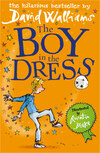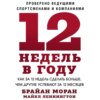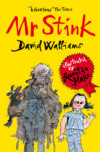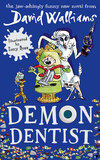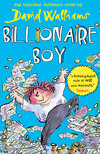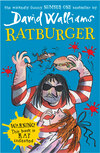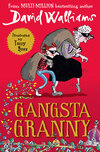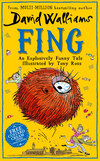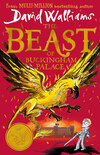Loe raamatut: «The Boy in the Dress»

Copyright
First published in hardback in Great Britain by HarperCollins
Children’s Books 2008 HarperCollins Children’s Books is a division of HarperCollins Publishers Ltd 1 London Bridge Street, London SE1 9GF
The HarperCollins Children’s Books website address is www.harpercollinschildrensbooks.co.uk
© David Walliams 2008
David Walliams and Quentin Blake assert the moral right to be identified as the author and illustrator of this work
All rights reserved under International and Pan-American Copyright Conventions. By payment of the required fees, you have been granted the nonexclusive, nontransferable right to access and read the text of this e-book on-screen. No part of this text may be reproduced, transmitted, downloaded, decompiled, reverse-engineered, or stored in or introduced into any information storage and retrieval system, in any form or by any means, whether electronic or mechanical, now known or hereinafter invented, without the express written permission of HarperCollins e-books.
Ebook edition © AUGUST 2012 ISBN: 9780007302086
Version 2019-07-17
Dedication
For Eddie, What joy you have given us all.
Contents
Title Page
Copyright
Dedication
Chapter 1 - No Hugging
Chapter 2 - Fat Dad
Chapter 3 - Under the Mattress
Chapter 4 - Wanting to Disappear
Chapter 5 - Just Doodling
Chapter 6 - Forever and a Moment
Chapter 7 - Watching the Curtain Edges Grow Light
Chapter 8 - Lying on the Carpet with Lisa
Chapter 9 - Bonjour, Denise
Chapter 10 - Pickled Onion Monster Munch
Chapter 11 - “These high heels are killing me”
Chapter 12 - Another World
Chapter 13 - Double French
Chapter 14 - Silence like Snow
Chapter 15 - There Was Nothing More to Say
Chapter 16 - With or Without the Dress
Chapter 17 - Maudlin Street
Chapter 18 - A Thousand Smiles
Chapter 19 - Dragged in the Mud
Chapter 20 - Blouse and Skirt
Chapter 21 - Big Hairy Hands
Chapter 22 - One Thing Left to Do
E-book Extra
About the Publisher


1 No Hugging
Dennis was different.
When he looked in the mirror he saw an ordinary twelve-year-old boy. But he felt different–his thoughts were full of colour and poetry, though his life could be very boring.
The story I am going to tell you begins here, in Dennis’s ordinary house on an ordinary street in an ordinary town. His house was nearly exactly the same as all the others in the street. One house had double glazing, another did not. One had a gravel drive, another had crazy paving. One had a Vauxhall Cavalier in the drive, another a Vauxhall Astra. Tiny differences that only really pointed out the sameness of everything.
It was all so ordinary, something extraordinary just had to happen.
Dennis lived with his dad–who did have a name, but Dennis just called him Dad, so I will too–and his older brother John, who was fourteen. Dennis found it frustrating that his brother would always be two years older than him, and bigger, and stronger.
Dennis’s mum had left home a couple of years ago. Before that, Dennis used to creep out of his room and sit at the top of the stairs and listen to his mum and dad shout at each other until one day the shouting stopped.
She was gone.
Dad banned John and Dennis from ever mentioning Mum again. And soon after she left, he went around the house and took down all the photographs of her and burnt them in a big bonfire.
But Dennis managed to save one.
One solitary photograph escaped the flames, dancing up into the air from the heat of the fire, before floating through the smoke and onto the hedge.

As dusk fell, Dennis snuck out and retrieved the photo. It was charred and blackened around the edges and at first his heart sank, but when he turned it to the light he saw that the image was as bright and clear as ever.
It showed a joyful scene: a younger John and Dennis with Mum at the beach, Mum wearing a lovely yellow dress with flowers on it. Dennis loved that dress; it was full of colour and life, and soft to the touch. When Mum put it on it meant that summer had arrived.
It had been warm outside after she had left, but it hadn’t really been summer in their house again.
In the picture Dennis and his brother were in swimming trunks holding ice-cream cones, vanilla ice-cream smeared around their smiling mouths. Dennis kept the photo in his pocket and looked at it secretly every day. His mum looked so achingly beautiful in it, even though her smile was uncertain. Dennis stared at it for hours on end, trying to imagine what she had been thinking when it was taken.
After Mum left, Dad didn’t say much, but when he did, he would often shout. So Dennis ended up watching a lot of television, and especially his favourite show, Trisha. Dennis had seen a Trisha episode about people with depression, and thought maybe his dad had that. Dennis loved Trisha. It was a daytime talk show where ordinary people were given the opportunity to talk about their problems, or yell abuse at their relatives, and it was all presided over by a kindly looking but judgemental woman conveniently called… Trisha.
For a while Dennis thought life without his mum would be some kind of adventure. He’d stay up late, eat take-aways and watch rude comedy shows. However, as the days turned into weeks, and the weeks turned into months, and the months turned into years, he realised that it wasn’t an adventure at all.
It was just sad.
Dennis and John sort of loved each other in that way that they had to because they were brothers. But John tested this love quite often by doing things he thought were funny, like sitting on Dennis’s face and farting. If farting had been an Olympic sport (at time of writing I am told it isn’t, which I feel is a shame), he would have won a number of gold medals and probably received a knighthood from the Queen.
Now, reader, you might be thinking that as their mum had left, the two brothers would be brought closer together.
Sadly, it only drove them apart.
Unlike Dennis, John was full of silent rage with his mum for leaving, and agreed with Dad that it was better never to mention her again. It was one of the rules of the house:
No talking about Mum.
No crying.
And worst of all–no hugging.
Dennis, on the other hand, was just full of sadness. Sometimes he missed his mum so much that he cried in bed at night. He tried to cry as quietly as possible, because he and his brother shared a room and he didn’t want John to hear.
But one night Dennis’s sobs woke John up.
“Dennis? Dennis? What are you crying for now?” demanded John from his bed.
“I don’t know. It’s just… well… I just wish that Mum was here, and everything,” came the reply from Dennis.
“Well, don’t cry. She’s gone and she’s not coming back.”
“You don’t know that…”

“She’s never coming back, Dennis. Now stop crying. Only girls cry.”
But Dennis couldn’t stop crying. The pain ebbed and flowed inside him like the sea, crashing down on him, almost drowning him in tears. He didn’t want to upset his brother, though, so he cried as quietly as he possibly could.
So why was Dennis so different, I hear you ask? After all, this boy lived in an ordinary house, in an ordinary street, in an ordinary town.
Well, I’m not going to tell you why yet, but the clue might be in the title of this book…
2 Fat Dad
Dennis’s dad jumped up and down and shouted with joy. Then he pulled Dennis into a tight hug.
“Two nil!” he said. “We showed ’em, eh son?”
Yes, I know I said there was no hugging in Dennis’s house. But this was different.
It was football.
In Dennis’s house talking about football was easier than talking about feelings. He, John and Dad all loved football, and together shared the highs and (more often) lows of supporting their local third-division team.
But as soon as the match finished and the referee blew his whistle, it was as if that sound also signalled a return to their strict no-hugging policy.
Dennis did miss being hugged. His mum had hugged him all the time. She was so warm and soft, he loved being held by her. Most children can’t wait to grow up and get bigger, but Dennis missed being small and being picked up by his mother. It was in her arms that he had felt most safe.
It was a shame Dennis’s dad hardly ever hugged him. Fat people are good at hugs, they’re nice and soft, like a big comfy sofa.
Oh, yes, didn’t I mention? Dad was fat.
Really fat.
Dad worked as a long-distance lorry driver. And all that sitting down and driving had taken its toll, only stretching his legs to go to the service station café and eat various combinations of eggs, sausage, bacon, beans and chips.

Sometimes, after breakfast, Dad would eat two packets of crisps. He just got fatter and fatter after Mum left. Dennis had seen a Trisha episode about a man called Barry who was so fat he couldn’t wipe his own bum. The studio audience were told about his daily food intake and “oohed” and “aahed” with a strange mixture of delight and horror. Then Trisha asked him, “Barry, does the fact that you have to get your mum or dad to wipe your… underneath… not make you want to lose weight?”
“Trisha, I just love me food,” was Barry’s smirking reply.
Trisha put it to Barry that he was “comfort eating”. Trisha was good with phrases like that. She had after all been through a lot of difficult times herself. Barry cried a bit at the end, and as the credits rolled Trisha smiled sadly and gave him a hug, though it was hard for her to really get her arms around Barry as he was the size of a small bungalow.
Dennis wondered whether his dad was comfort eating too, having one more sausage or slice of fried bread at breakfast to–in Trisha’s words–“fill the emptiness inside”. But he didn’t dare share that thought with his dad. Dad wasn’t keen on Dennis watching the show anyway. He said, “It’s just for girls, that.”
Dennis dreamed of one day having his own Trisha episode, with the title, “My brother’s farts smell well bad” or “My dad has a chocolate Hob-Nob problem”. (Dad ate a whole packet of the admittedly more-ish biscuits every day when he got home from work.)
So when Dennis, his dad and John played football, Dad would always go in goal, because he was so fat. He liked it because it meant he didn’t have to run around that much. The goal was an upturned bucket and an empty beer keg, a remnant from a long-forgotten barbecue they’d once had when Mum was still around.
They didn’t have barbecues any more. These days they had battered sausages from the local chippy, or bowls of cereal, even when it wasn’t breakfast.
What Dennis loved most about playing football with his family was that he was the best. Even though his brother was two years older, Dennis could run rings around him in the garden, tackling, dribbling, and scoring with great skill. And it wasn’t like it was easy to get the ball past his dad. Not because Dad was good in goal–it was just that he was so big…

On Sunday mornings Dennis used to play football for his local club. He dreamed of being a professional footballer, but after his mum and dad split up he stopped going. He had always relied on his mum to give him a lift–Dad couldn’t take him as he was forever driving up and down the country in his lorry trying to make ends meet.
So Dennis’s dream floated quietly away.
Dennis did play football for his school though, and was his team’s number one… shooter?
Sorry, reader, I must look this up.
Ah, striker.
Yes, Dennis was his team’s number one striker, scoring over a million goals in a year.
Excuse me again, reader, I don’t know much about football, maybe a million is too much. A thousand? A hundred? Two?
Whatever, he scored the most goals.
As a result, Dennis was incredibly popular with his team-mates–except the captain, Gareth, who picked Dennis up on every little mistake on the pitch. Dennis suspected that Gareth was jealous of him because he was a better footballer. Gareth was one of those boys who are unusually large for their age. In fact you wouldn’t be surprised to find he was really five years older than everyone else in his year, but had just been held back on account of being a bit thick.
Once, Dennis was off school with a really bad cold on a match day. He had just finished watching that day’s Trisha, a gripping episode about a woman who discovered she was having an affair with her own husband. Then he was looking forward to some Heinz tomato soup and his second favourite show Loose Women, where a panel of angry looking ladies debated important issues of the day–like diets and leggings.
But just as the signature tune was starting there was a knock at the door. Dennis got up grumpily. It was Darvesh, Dennis’s best friend at school.
“Dennis, we desperately need you to play today,” pleaded Darvesh.
“I’m sorry, Darvesh, I’m just not feeling well. I can’t stop sneezing or coughing. Aaachoooo! See?” replied Dennis.
“But it’s the quarter finals today. We’ve always got knocked out at the quarter-finals before. Please?”
Dennis sneezed again.

It was such a strong sneeze he thought he was going to turn inside out.
“Pleeeaaassseee,” said Darvesh hopefully as he discreetly wiped some of Dennis’s stray snot from his tie.
“OK, I’ll try,” coughed Dennis.
“Yeeeessss!” exclaimed Darvesh, as if victory was already theirs.
Dennis gulped down a couple of mouthfuls of soup, grabbed his kit and ran out of the house.
Darvesh’s mum was sitting in her little red Ford Fiesta outside, with the engine running. She worked on the tills at Sainsbury’s, but lived to see her son play football. She was the proudest mum in the world, which always made her son squirm a little.

“Thank goodness you have come, Dennis!” she said as Dennis clambered onto the back seat. “The team needs you today, it’s a very important match. Without doubt the most important match of the season!”
“Just drive please, Mum!” said Darvesh.
“All right! All right! We’re going! Don’t talk to your mother like that Darvesh!” she shouted, pretending to be angrier than she really was. She put her foot on the accelerator and the car lurched uncertainly off towards the school playing fields.
“Oh, you’ve decided to come have you?” growled Gareth as they pulled up. Not only was he bigger than everyone else, he had a deeper voice, and was disturbingly hairy for a boy his age.
When he showered he looked like a big monkey.
“Sorry, Gareth I just wasn’t feeling well. I have a pretty bad…”
Before Dennis could say “cold,” he sneezed again even more violently than before.


“Oh sorry, Gareth,” said Dennis, wiping a small gloop of snot from Gareth’s ear with a tissue.
“Let’s just do this,” said Gareth.
Feeling weak with illness, Dennis ran onto the school pitch with his team, coughing and spluttering all the way.
“Good luck boys! Especially my son Darvesh, and of course his friend Dennis! Let’s win this for the school!” shouted Darvesh’s mum from the side of the pitch.
“My mum is like so embarrassing,” rumbled Darvesh.
“I think it’s cool she comes,” said Dennis. “My dad’s never seen me playing in a match.”
“Let’s see a nice goal from you today please, Darvesh my son!”
“Mmm, maybe she is a bit embarrassing,” agreed Dennis.
That afternoon they were playing St Kenneth’s School for Boys, one of those schools where the pupils felt a little superior just because their parents had to pay for them to go there. They were a very good team though, and within the first ten minutes had scored. The pressure was immediately on, and Darvesh stole the ball off a boy who looked twice his size and passed it to Dennis.
“Lovely tackle, Darvesh my son!” shouted Darvesh’s mum.
The thrill of possessing the ball made Dennis forget his cold for a moment, and he weaved his way through the defence and approached the goal-keeper, a luxuriant-haired boy sporting brand new kit, who was probably called Oscar or Tobias or something. All of a sudden they were face to face, and Dennis sneezed again uncontrollably.

The snot exploded onto the goalie’s face, blinding him for a moment, and all Dennis needed to do was tap the ball past the line.
“Foul!” shouted the goal-keeper, but the referee allowed it. It was foul, but not technically a foul.
“I’m sorry about that,” said Dennis. He really hadn’t meant to do it.
“Don’t worry, I have a tissue!” exclaimed Darvesh’s mum. “I always carry a packet with me.” She hurtled onto the pitch, hitching up her sari to avoid the mud and ran up to the goalie. “There you go, posh boy,” she said, handing him the tissue. Darvesh rolled his eyes at his mother’s one-woman pitch invasion. The goalie tearfully wiped Dennis’s mucous from his floppy hair. “Personally I think St Kenneth’s doesn’t stand a chance,” she added.
“Mummmm!” shouted Darvesh.
“Sorry! Sorry! Play on!”
Four goals later, one from Dennis, one from Gareth, one from Darvesh, and one ‘accidental’ deflection from Darvesh’s mum and the game was won.
“You are through to the semi-final boys! I can’t wait!” exclaimed Darvesh’s mum as she drove the boys home, beeping out tunes on the Ford Fiesta’s horn in celebration. For her it was as if England had won the world cup.
“Oh please don’t come Mum, I beg you. Not if you’re gonna do that again!”
“How dare you, Darvesh! You know I wouldn’t miss the next game for the world. Oh you make me so proud!”
Darvesh and Dennis looked at each other and smiled. For a moment their victory on the pitch made them feel like they owned the Universe.
Even Dad raised a smile when Dennis told him that his team were through to the semifinals.
But Dad wasn’t going to stay happy for long…
Tasuta katkend on lõppenud.
